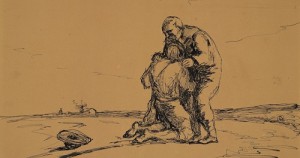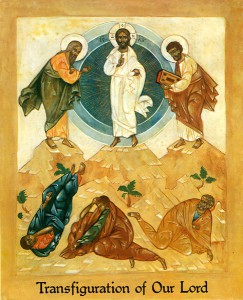![]()
“Even though I walk through the valley of the shadow of death,
I will fear no evil for you are with me, your rod and your staff they comfort me.â€
“The Lord is my shepherd, I shall not want…â€
There was an occasion that is recorded in Luke’s gospel where Jesus got involuntarily caught up in an argument over the division of an inheritance among the family. “Someone in the crowd said to him, “Teacher, tell my brother to divide the inheritance with me.†But he said to him, “Man, who made me a judge or arbitrator over you?†And he said to them, “Take care, and be on your guard against all covetousness, for one’s life does not consist in the abundance of his possessions.†(Lk. 12:13-15)
When we hear the Psalmist confess, “The Lord is my shepherd, I shall not want…†and as we make this our confession, we are not talking about “want†in terms of “the abundance of possessions,†whether those ‘possessions’ be material possessions, or intellectual ‘possessions,’ or other ‘people’ whom we may also want to ‘possess.’
The Bible as well as the daily newspaper are full of examples of people who have no ‘want’ for any of these possessions and yet are ‘deeply wanting’ in that possession that the Psalmist is speaking of in this Psalm. He is a sheep of the Lord’s pasture, and the Lord is His shepherd, and with that, he has all that he ‘wants.’ Material, intellectual, personal possessions are all entirely secondary to the ‘peace’ and ‘security’ and ‘well-being’ that he has as a sheep of the Lord’s flock.
“The Lord is my shepherd, I shall not want…â€
This is an easy confession to make when, as David confesses in a previous Psalm, “The lines have fallen for me in pleasant places; indeed, I have a beautiful inheritance.†(Psalm 16:6)
But what about when the ‘lines’ fall in ‘unpleasant places,’ as they so often do? What about when you are in the “valley of the shadow of death†and are surrounded by the “gloom†and “darkness†that we spoke of last week? Can we still confess, “I shall not wantâ€?
Why is it that we love to sing Luther’s famous battle hymn with gusto, even while we confess, “were they to take our house, goods, honor, child or spouse, though life be wretched away, “I shall not want,†“the kingdom’s ours forever.�
I. “Even though I walk through the valley of the shadow of death, I will fear no evil…â€
“Fear†can be a terribly debilitating thing. “Fear†can drain the courage right out of an otherwise brave person. “Fear†is the opposite of ‘security.’ When I feel ‘secure’ I have a high level of confidence that I am safe. ‘Safe and secure’ go together. When I’m ‘safe and secure,’ I’m ready to tackle any problem and meet any opposition with confidence.
But when I am not confident that I am safe, fear sets in. And ‘fear’ drives me to seek ‘security’ in whatever it is that I believe will make we ‘safe and secure.’
One of the many devastating things about our fallen and sinful nature is that we seek ‘safety and security’ in those things that are neither safe nor secure. If my deepest sense of security is based on a wise government or an effective police force or a powerful military, and they stumble or even fail, my sense of ‘security’ stumbles and falls with it and ‘fear’ takes over.
To be clear, not all “fear†is all bad. There is such a thing as a ‘good’ and ‘healthy’ fear. Parents teach their children to ‘fear’ that which can harm them. We are supposed to ‘fear’ and even ‘hate’ that which is ‘evil’ because ‘evil’ can ‘harm,’ even ‘kill’ us. Our ‘fear’ of evil drives us away from it. Rather that ‘trusting’ and ‘loving’ what is evil, which is the way we come into this world, we are to ‘fear and hate’ what is evil. And that requires a ‘conversion.’
But ‘fear and hate’ of what is evil is only half of what “conversion†is all about. If that’s as far as it goes, if we only what we are supposed ‘fear’ and ‘hate’, we’re left with nothing to trust and no one to depend upon to defend us. As Luther teaches us, we must also ‘fear and love’ what is good. And there is only one who is good, and that is God.
When we ‘fear and hate’ evil with all our heart and soul and mind, and ‘fear and love’ God with all our heart and soul and mind, we are the people whom God created and converted us to be.
So when we hear David say, “I will fear no evil,†it is not that he has no concern or respect for the harm that evil is capable of doing. But his fear of evil is overcome by his fear and love of the Lord, his shepherd.
David has complete confidence in his Lord, that he is able to deliver him from whatever evil may be present in this valley of shadows and death. How little could David have known just how well placed his confidence in his Lord was?
For David’s Lord would confront the full force of ‘evil’ head on, and overcome it, proving beyond dispute that real safety and security is found only when “the Lord is my shepherd.†How could David have known this, except by faith? How much should we know this, except by faith that has been made more sure than David’s.
II. “I will fear no evil, for you are with me…â€
Israel’s security rested on the assurance of God’s presence with them. As they traveled through their own ‘valley of death’ in the desert, they went with the confidence that God was ‘with them’ in the pillar of cloud by day and fire by night.
No other nation had so much confidence in their god. If the pagans wanted to be in the presence of their god, they had to go to the temple where an handmade idol was fashioned to be the presence of their god. But when they left the temple, their god did not go with them.
Israel had their own temple or tabernacle where God was present with them. But unlike the pagans, their God went with them wherever they went. The Psalmist expresses his fearless confidence in the omnipresence of his Lord saying, “Where shall I go from your Spirit? Or where shall I flee from your presence? If I ascend to heaven, you are there! If I take the wings of the morning and dwell in the uttermost parts of the sea, even there your hand shall lead me, and your right hand shall hold me.†(Psalm 139:7-10)
The confidence of the Psalmist and Israel and David is our confidence as well. The angel Gabriel tells Joseph that his fiancee Mary is pregnant with a child conceived by the Holy Spirit, fulfilling the infallible promise of God through the prophet Isaiah, “Behold, the virgin shall conceive and bear a son and they shall call his name Immanuel, which means ‘God with us.’†(Matthew 1:23).
On Thursday next week, we’ll consider how this Immanuel “prepares a table before us…†that in eating and drinking the bread and wine, we have His presence with us, even in us, that we may “walk through the valley of the shadow of death†without fear, “for you are with me.â€
III. “Your rod and your staff, they comfort me.â€
It is as though David is anticipating the sacramental nature of His Lord’s presence with us when he points to the objects of his comfort. The ‘rod’ and the ‘staff’ of the middle-eastern shepherd are two different things, each with its own purpose.
The shepherd’s ‘rod’ is his principle ‘offensive’ weapon for defending his sheep. The typical ‘rod’ was about 2 ½ feet long with a large end into which sharp pieces of iron or bone were embedded. It was used to fight off wild animals as well as thieves.
David defended his ability to go against the giant Goliath by telling Saul that, as a shepherd, when a lion, or a bear came and took a lamb from the flock, he went after it and struck it and killed it and delivered the lamb out of his mouth. (1 Samuel 17:34-35). David was referring to his use of his ‘rod’ to defend his flock from external harm.
The other important instrument in the hand of a shepherd was his ‘staff.’ The traditional shepherd’s staff is at least 5 feet long and almost always has a crook at the end of it. The shepherd leans on his staff, climbs with it, and uses it to direct his sheep. When a lamb cannot scramble down from a ledge or falls into a crevice or down a bank into a stream, the shepherd is able to catch the lamb in the crook and gently lift it back onto the path.
These two instruments form a pair. The ‘rod’ is used to protect the flock from ‘external threats.’ The ‘staff’ serves to gently assist the flock in staying on the right path. The two of these together give “comfort†to the sheep.
For us, His ‘rod’ and ‘staff’ find their reality in His Word of ‘Law’ and ‘Gospel.’ The ‘rod’ is like the Law of God that is meant to break and hinder every evil that would hurt and devour us. “You shall have no other gods. You shall not take the name of the Lord your God in vain,†and so forth as we spoke the 10 Commandments together.
The ‘staff’ is like the Gospel that is meant to assure us that we have a gracious God who does not desire the death of the sinner but that we should be caught up in His gentle crook and restored to the ‘right path’ and be saved.
To the sheep of the Good Shepherd who follow Him even as He leads His flock into the ‘valley of the shadow of death†and are prone to ‘fear evil,’ we hear voice say, “fear not, for I am with you…†(Isaiah 43:5) “Take heart. It is I. Do not be afraid.†(Matt. 14:27).
The assurance of His presence among us as we hear His voice speak to us, and receive His very body and blood, transforms our fears into courage and we walk even through the valley of the shadow of death in safety and security, and with hearts that are comforted.

 On Palm Sunday, Jesus entered Jerusalem on a donkey and went straight to the
On Palm Sunday, Jesus entered Jerusalem on a donkey and went straight to the What the Pharisees and Scribes didn’t understand, and what many still fail to understand, is that Jesus came into this world to save sinners. “Those who are well have no need of a physician, but those who are sick. I came not to call the righteous, but sinners.†(Mark 2:17)
What the Pharisees and Scribes didn’t understand, and what many still fail to understand, is that Jesus came into this world to save sinners. “Those who are well have no need of a physician, but those who are sick. I came not to call the righteous, but sinners.†(Mark 2:17) “Come follow me.†It’s the call to discipleship, of which Dietrich Bonhoeffer says, ‘when Jesus Christ calls a man to come follow Me, he calls him to come forth and die.’ ‘If anyone would come after me, let him deny himself and take up his cross daily…â€
“Come follow me.†It’s the call to discipleship, of which Dietrich Bonhoeffer says, ‘when Jesus Christ calls a man to come follow Me, he calls him to come forth and die.’ ‘If anyone would come after me, let him deny himself and take up his cross daily…â€